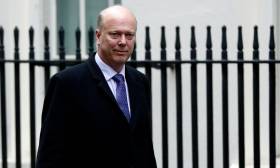Displaying items by tag: UK Transport Secretary
Calls Mount for UK Transport Secretary Resignation Is Followed by Arklow Shipping Revelation
#ferries - The UK Transport Secretary reports Channel 4 News, has been facing mounting calls for his resignation after he cancelled a £14 million contract with ferry company Seaborne Freight.
The government pulled the rug on the contract yesterday after revealing that Arklow Shipping – a firm which was set to be a majority shareholder in Seaborne – had itself backed out.
But Channel 4 News (tonight) revealed that that company had never agreed any contract and blamed the UK government for pushing the deal through too fast.
For more on the proposed Ramsgate-Belgium service click report along with footage of Arklow Shipping's 8660dwat leadship 'B' class Arklow Bank and Bay when launched in the Netherlands, which Afloat reported of both back in 2014.
Sack UK Transport Secretary Over Brexit Ferry Fiasco, Demand MPs
#ferries - UK prime minister Theresa May faced cross-party calls to sack her transport secretary, Chris Grayling, last night, after the calamitous collapse of a no-deal Brexit ferry contract handed to a company with no ships.
As The Guardian reports, senior tories said the prime minister had turned “a blind eye” to Grayling’s decision to award the £13.8m contract to Seaborne Freight to run ferries between Ramsgate and Ostend, despite widespread derision and accusations that it had been awarded illegally.
The collapse of the contract comes amid growing unease in the international business community about Britain’s preparedness for a no-deal outcome, with less than 50 days until Brexit is due to take place.
Several MPs suggested Grayling should now consider his position after his department revealed the contract had been cancelled, and Bob Kerslake, the former head of the civil service, said the saga would “just confirm the view of many that this country is in a mess”.
Anna Soubry, a former Tory business minister, said Grayling “should be quietly considering his position”.
“Chris Grayling holds a critical position in government, trying to mitigate what would be a very serious crisis for the country if we leave the European Union without a deal,” she said. “He has no grip on the very serious nature of his job. The prime minister should also be considering whether there is not someone else who could do the job better.”
Another senior Tory MP said Grayling was a “walking disaster zone”, adding: “A no-deal Brexit would be a major national crisis and stories like this suggest we have not got the people in place who are capable of responding to it.”
Another said: “Grayling never has a grip on the detail, as the Seaborne mess shows. His Heathrow proposal will be just the same but way more costly. The PM just turns a blind eye, for some reason.”
Andy McDonald, the shadow transport secretary, said: “While Theresa May needs the few friends she has right now, we cannot have this incompetent transport secretary heaping humiliation after humiliation on our country. He has to go.”
Joining the attacks, Vince Cable, the Lib Dem leader, said: “I very rarely call on ministers to go, but failing Grayling has made too many crass mistakes. He has already lost the confidence of the civil service as they now require a ministerial directive for the government to spend money on ferries.”
Downing Street last night said the prime minister had full confidence in Grayling.
The Department for Transport said the deal was terminated after Irish company Arklow Shipping, which had backed Seaborne, stepped away from the deal. “It became clear Seaborne would not reach its contractual requirements,” a spokeswoman said. “We have therefore decided to terminate our agreement.”
For more on this ferry development, click here.





























































